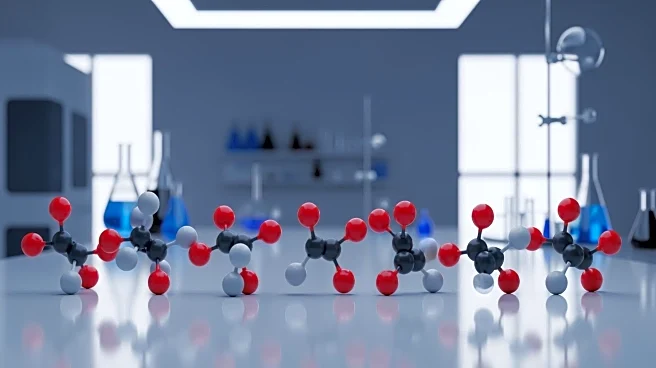What's Happening?
Recent research has spotlighted the importance of lipid quality control in the development of mRNA vaccines, particularly focusing on lipid nanoparticles (LNPs). The study identifies oxidation species
and reactive aldehyde species that contribute to mRNA lipid adduction, which can impact the stability and efficacy of mRNA-based vaccines. The investigation reveals that unsaturated lipid groups in LNPs are susceptible to oxidative stress, leading to the formation of reactive aldehydes. This underscores the need for stringent lipid quality control during the manufacturing process to ensure the stability and effectiveness of mRNA vaccines. The research also explores the use of self-amplifying mRNA (sa-mRNA) technology, which encodes information for non-structural proteins that amplify its own transcript, offering potential advancements in vaccine development.
Why It's Important?
The findings are significant for the pharmaceutical industry, particularly in the context of mRNA vaccine development. Ensuring lipid quality control can enhance the stability and efficacy of vaccines, which is crucial for public health. The study's insights into oxidative stress and lipid adduction could lead to improved manufacturing processes, reducing the risk of vaccine degradation. This has implications for the broader adoption of mRNA technology in various therapeutic areas, including cancer treatment. Stakeholders in the healthcare sector, including vaccine manufacturers and regulatory bodies, stand to benefit from these advancements, potentially leading to more robust and effective vaccines.
What's Next?
The research suggests that further investigations are needed to mitigate mRNA modifications by controlling reactive species present in LNPs. This could involve developing new lipid formulations or refining existing ones to minimize oxidative stress. The study also points to the potential for sa-mRNA technology to be leveraged in future vaccine development, requiring additional research to optimize its application. As the pharmaceutical industry continues to explore mRNA technology, ongoing collaboration between researchers, manufacturers, and regulatory agencies will be essential to address these challenges and advance vaccine innovation.
Beyond the Headlines
The study highlights ethical considerations in vaccine development, particularly the need for transparency in manufacturing processes to ensure public trust. The focus on lipid quality control also raises questions about the environmental impact of pharmaceutical production, prompting discussions on sustainable practices. Additionally, the research could influence long-term shifts in vaccine technology, potentially leading to new therapeutic approaches beyond infectious diseases, such as personalized cancer vaccines.









